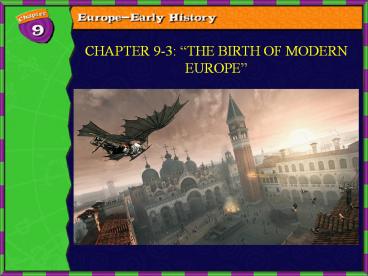Presentation Plus! PowerPoint PPT Presentation
1 / 18
Title: Presentation Plus!
1
CHAPTER 9-3 THE BIRTH OF MODERN EUROPE
2
(No Transcript)
3
(No Transcript)
4
(No Transcript)
5
Introduction
- The Middle Ages ended gradually as cities grew
and trade increased. - The system of feudalism also declined.
- The Renaissance followed the Middle Ages.
- Historians trace the beginnings of the Modern
Age in the West to the Renaissance. - The movement of society into the Modern Age was
complete by the time of the French Revolution and
the Napoleonic Wars in 1815.
6
Section 3-5
The Renaissance
- The Renaissancesparked by an interest in
education, art, and sciencebegan around 1350 in
cities of northern Italy and spread to other
cities of Europe. ? - Curiosity and enthusiasm for life were at the
heart of the Renaissance.
(pages 245246)
Click the mouse button or press the Space Bar to
display the information.
7
Section 3-6
The Renaissance (cont.)
- Noted Renaissance artists were Leonardo da Vinci
and Michelangelo Buonarotti. ?
- During the Renaissance, writers began to use the
language they spoke every day instead of Latin or
French, the language of the educated. - Geoffrey Chaucer and William Shakespeare wrote
in English. - Miguel de Cervantes wrote in Spanish.
(pages 245246)
Click the mouse button or press the Space Bar to
display the information.
8
Section 3-7
The Renaissance (cont.)
- The printing press with moveable type was
invented around 1450 by Johannes Gutenberg. ?
- The printing press made books more numerous and
less expensive, thereby encouraging more people
to learn to read and write. ? - Western European rulers became more powerful.
(pages 245246)
Click the mouse button or press the Space Bar to
display the information.
9
Section 3-9
The Protestant Reformation
- Some people during the Renaissance believed that
Catholic Church leaders were more interested in
wealth than religion. ?
- Others disagreed with corrupt practices of the
Catholic Church. ? - Because these Christians protested Catholic
teachings, they came to be called Protestants. ? - The movement to reform, or change, the Catholic
Church was called the Protestant Reformation.
(pages 246247)
Click the mouse button or press the Space Bar to
display the information.
10
Section 3-10
The Protestant Reformation (cont.)
- Two Protestant leaders were Martin Luther, who
organized his own new Christian Church that
taught in German, and John Calvin, whose
followers were called Puritans, included the
American Pilgrims.
(pages 246247)
11
The Age of Exploration
12
Section 3-12
The Age of Exploration
- By the mid-1400s, Europe began to reach out
beyond its boundaries in a great age of discovery
and exploration. ?
- In 1492, King Ferdinand and Queen Isabella of
Spain sent an Italian navigator, Christopher
Columbus, westward across the Atlantic searching
for another way to Asia.
(page 247)
Click the mouse button or press the Space Bar to
display the information.
13
Section 3-13
The Age of Exploration (cont.)
- The Dutch, English, and French soon joined the
Spanish and Portuguese in exploring and settling
and trading with the Americas, Asia, and Africa. ?
- Eventuallyin addition to trade goodspeople,
diseases, and ideas were distributed around the
world in a process called the Columbian Exchange.
(page 247)
Click the mouse button or press the Space Bar to
display the information.
14
Revolution
15
Section 3-15
Revolution
- A revolution is a great and often violent change.
?
- In America, the colonies won freedom from their
European mother countries. ? - In Europe, people fought for freedom from their
kings, queens, and nobles. - People once believed in the divine right of kings
that kings and queens ruled by the will of God.
(pages 247249)
Click the mouse button or press the Space Bar to
display the information.
16
Section 3-16
Revolution (cont.)
- Toward the end of the eighteenth century, people
came to feel that they should play a greater,
more direct role in government. ?
- John Locke and Jean Jacques Rousseau believed the
government should serve the people and protect
them and their freedom.
(pages 247249)
Click the mouse button or press the Space Bar to
display the information.
17
Section 3-17
Revolution (cont.)
- In Britain, kings and queens were forced to
accept a constitution, a plan for government that
shared power, but gave most of it to the
Parliament, the law making body. ?
- In the 1770s, the American colonies revolted
against European control and became a model for
many revolutions in Europe and the Americas. ?
(pages 247249)
Click the mouse button or press the Space Bar to
display the information.
18
Revolution (cont.)
- The French Revolution stimulated other peoples to
demand more personal and political control over
their lives.

